You can never have enough all-purpose side dish recipes, like Balsamic Roasted Vegetables. These sweet and savory caramelized vegetables are versatile (use any vegetables), they hold up well to reheating (perfect for meal prep), and their flavor matches with a wide variety of main dishes. They even make a simple yet stunning Thanksgiving side dish!
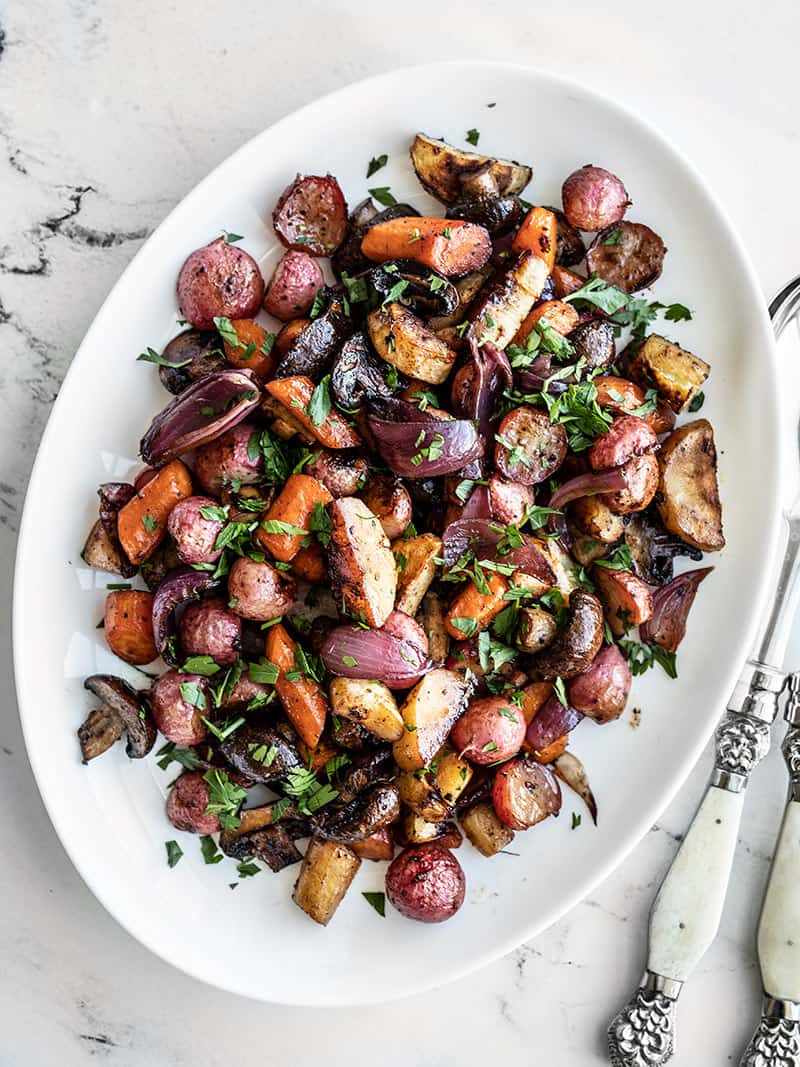
What Vegetables Can I Use?
You can roast just about any vegetable in this sweet, savory, and tangy balsamic marinade. The key is to match your vegetables to the season. Summer vegetables tend to be softer, so they’ll take less time to roast. Fall and winter vegetables are harder and will take more time to roast. Choose vegetables of a similar type so they cook at a similar rate. Here are some vegetable options:
Soft Spring and Summer Vegetables: Asparagus, grape tomatoes, zucchini, yellow squash, bell peppers, eggplant, mushrooms, onions.
Hard Fall and Winter Vegetables: Carrots, parsnips, radishes, turnips, Brussels sprouts, onion, turnips, butternut squash, sweet potatoes.
What Should I Serve with Balsamic Roasted Vegetables?
My favorite pairing for balsamic roasted vegetables is any type of roasted meat (roast chicken, beef, or pork), but they also go beautifully with the smoky flavor of grilled meats. The savory-sweet flavor of the balsamic marinade also pairs quite well with BBQ sauce, so any type of BBQ meat would be a great match. I’ve also paired balsamic roasted vegetables with seasoned rice in the past for a simple vegetarian dish. Lastly, when using fall and winter vegetables, as I have today, this dish makes a simple and beautiful side for your Thanksgiving dinner.
Tips for Roasting Vegetables
Here are a few tips for getting great results when roasting any type of vegetable:
- Chop harder vegetables into smaller pieces and softer vegetables into larger pieces to help them roast at a more similar rate.
- Use plenty of oil. Without enough oil the vegetables will shrivel and dry instead of caramelize.
- Don’t overcrowd the baking sheet. If the vegetables are too crowded, steam will become trapped and the vegetables will stew in their own juices instead of caramelize.
- Don’t forget to stir! Stirring the vegetables at least once, half-way through the roasting time will ensure even cooking.
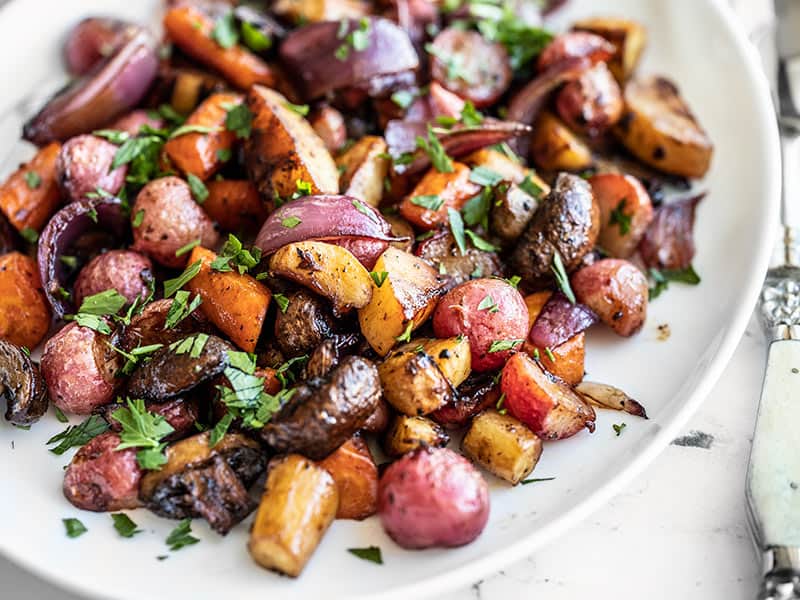
Balsamic Roasted Vegetables
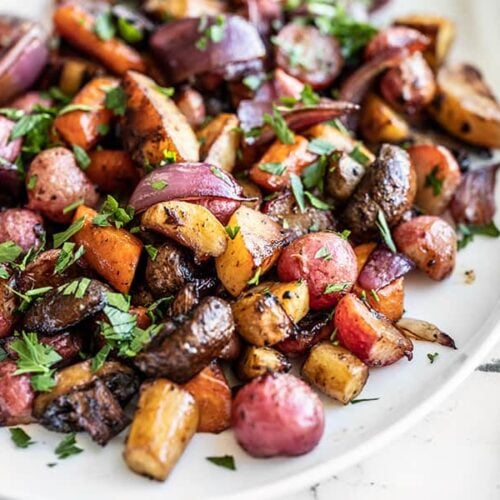
Ingredients
Balsamic Marinade
- 3 Tbsp olive oil ($0.48)
- 3 Tbsp balsamic vinegar ($0.41)
- 2 Tbsp brown sugar ($0.08)
- 2 Tbsp soy sauce ($0.24)
- 1/2 Tbsp Dijon mustard ($0.09)
- 1/2 tsp dried basil ($0.05)
- freshly cracked black pepper ($0.03)
Vegetables
- 8 oz. mushrooms (baby bellas or button mushrooms) ($1.69)
- 1 red onion ($0.44)
- 1/2 lb. carrots ($0.45)
- 1/2 lb. parsnips ($1.06)
- 1 bunch radishes ($0.99)
- 1/4 bunch parsley (for garnish) ($0.20)
Instructions
- Preheat the oven to 400ºF. In a small bowl, combine the olive oil, balsamic vinegar, brown sugar, soy sauce, Dijon mustard, dried basil, and pepper. Set the marinade aside.
- Scrub or peel the carrots and parsnips, then slice them into 1-inch pieces. Wash the mushrooms and cut them in half. Peel the onion and slice it into 1-inch wide wedges. Wash the radishes, cut off their stems and roots, then slice each one in half.
- Spread the prepared vegetables out over a large baking sheet, making sure they're in a single layer and no piled on top one another. Pour the balsamic marinade over top, then toss the vegetables until they're all well coated.
- Transfer the baking sheet to the oven and roast for 20 minutes. Carefully remove the baking sheet from the oven, give the vegetables a good stir, then return them to the oven and roast for an additional 15-20 minutes, or until the vegetables are tender and have browned on the edges. Don't be alarmed if the marinade blackens on the baking sheet, that part will not be scooped up with the vegetables.
- While the vegetables are roasting, finely chop a handful of fresh parsley. Transfer the roasted vegetables to a bowl or serving platter and sprinkle the chopped parsley over top just before serving.
See how we calculate recipe costs here.
Nutrition
Scroll down for the step by step photos!
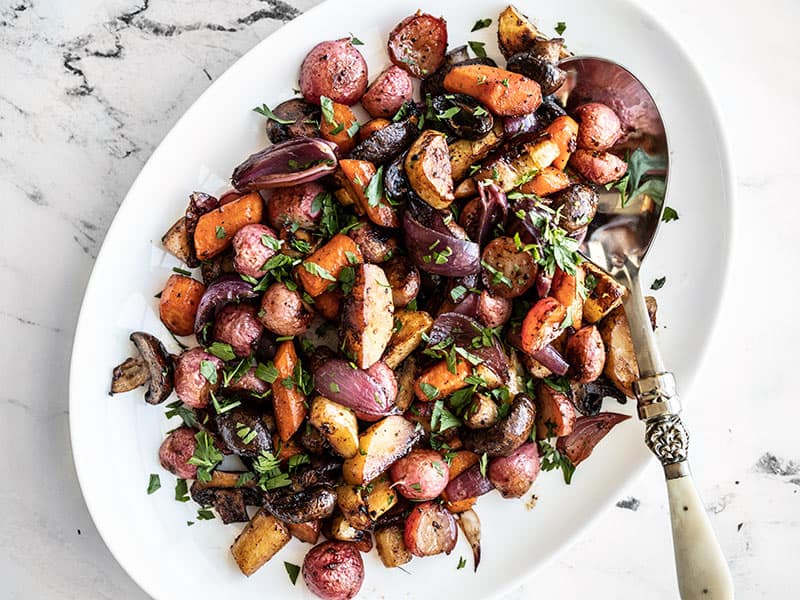
How to Make Balsamic Roasted Vegetables – Step by Step Photos
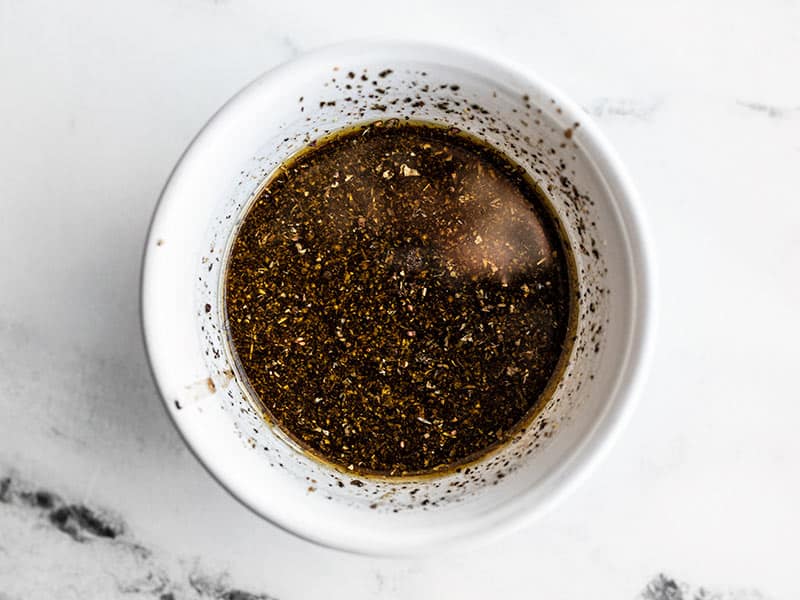
Preheat the oven to 400ºF. In a small bowl, combine 3 Tbsp olive oil, 3 Tbsp balsamic vinegar, 2 Tbsp brown sugar, 2 Tbsp soy sauce, 1/2 Tbsp Dijon mustard, 1/2 tsp dried basil, and some freshly cracked pepper (maybe 10 cranks of a pepper mill). Set the marinade aside.
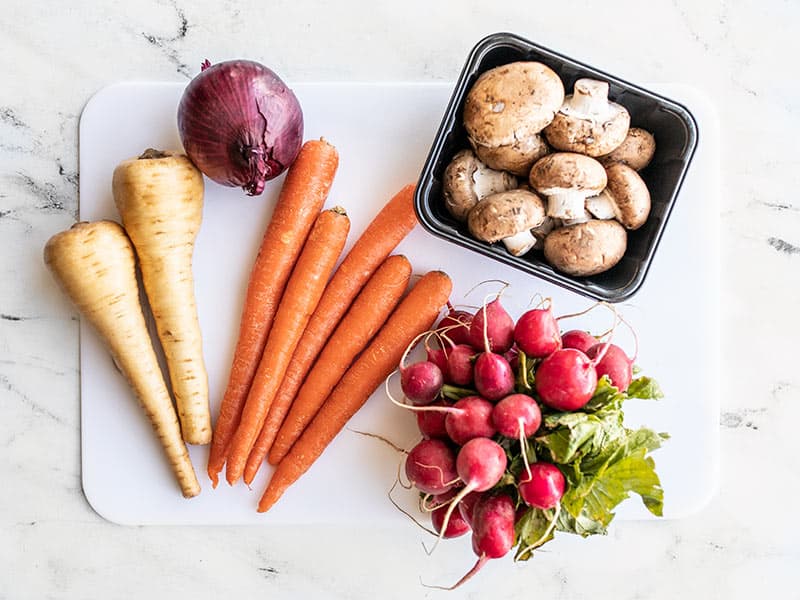
As mentioned above, you can use just about any vegetable for this recipe, but it’s best to match your vegetables to the season (see section above recipe for alternative vegetable ideas). Today I am using one red onion, 8 oz. baby bella mushrooms, 2 parsnips (1/2 lb.), 1/2 lb. carrots, and one bunch of radishes.
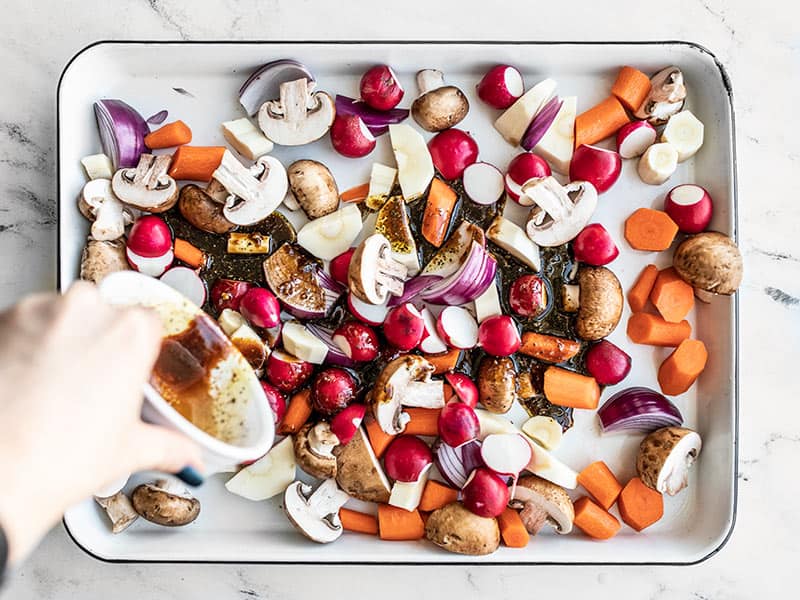
Clean and chop the vegetables so they are roughly similar sizes, making the harder vegetables slightly smaller and softer vegetables slightly bigger. Place the chopped vegetables on a large baking sheet, so they’re spread out in a single layer. Pour the balsamic marinade over top, then toss until the vegetables are all well coated.
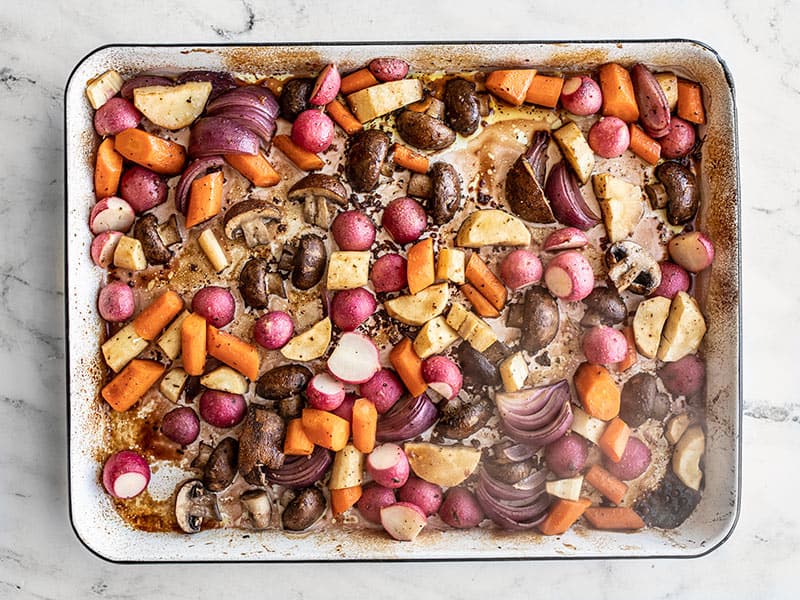
Transfer the vegetables to the preheated 400ºF oven and roast for 20 minutes. After 2o minutes, remove the baking sheet and ive the vegetables a good stir (pictured above).
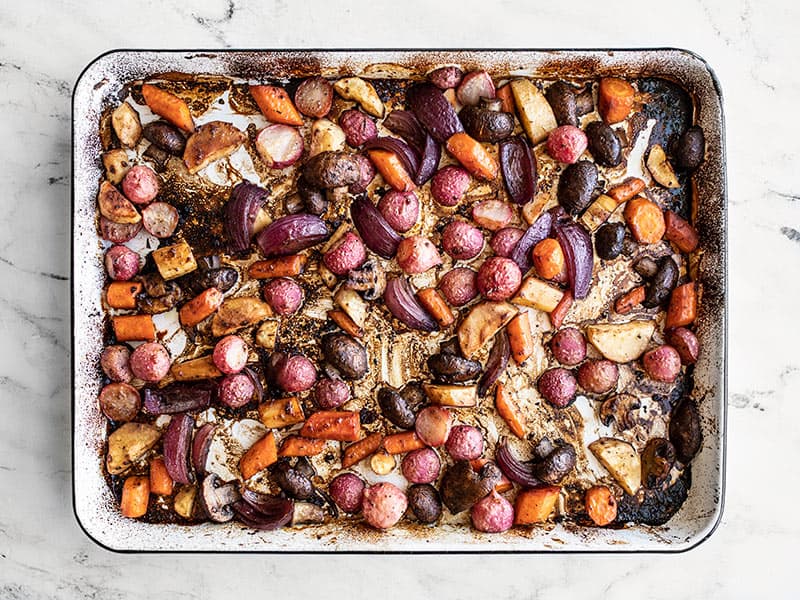
Return the vegetables to the oven and roast for an additional 15-20 minutes, or until the vegetables are tender and browned on the outside. Don’t be alarmed if some of the marinade burns on the baking sheet. The vegetables themselves are not burned and the part stuck to the baking sheet will be left behind (a quick soak and it will all dissolve off, too).
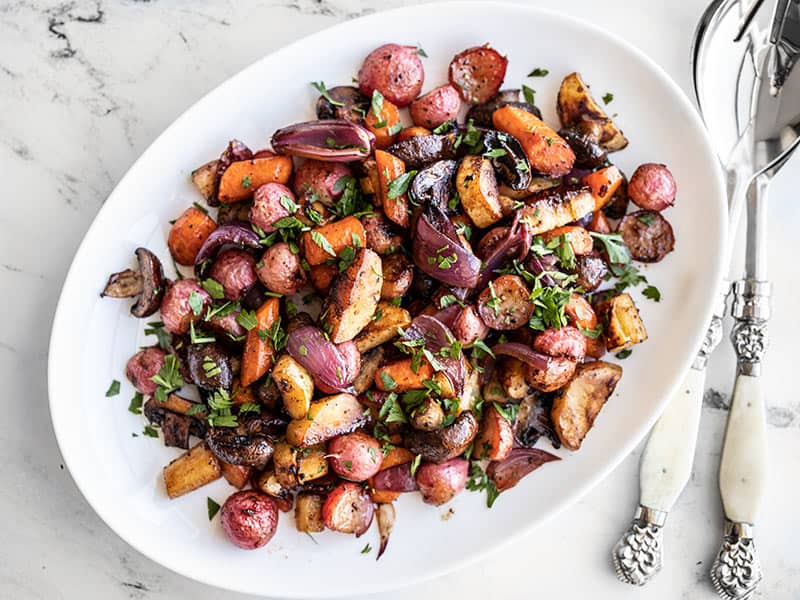
After roasting, transfer the balsamic roasted vegetables to a bowl or serving platter and top with chopped parsley.
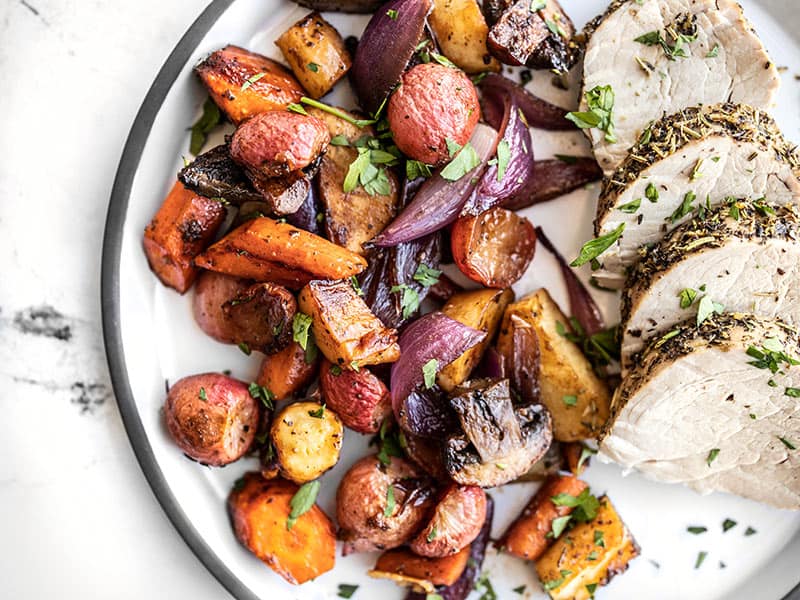
Serve with Herb Roasted Pork Tenderloin.


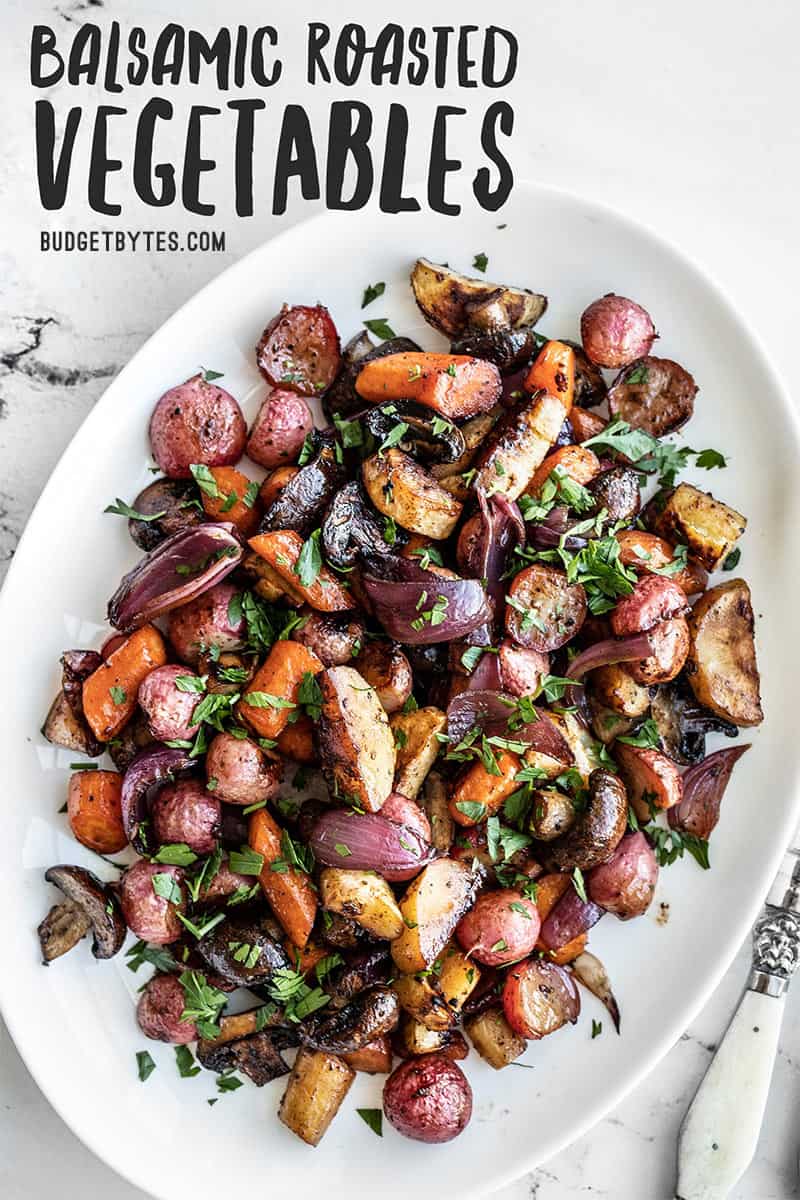
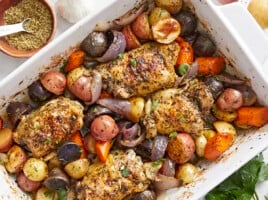
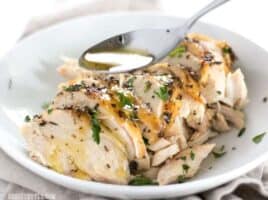
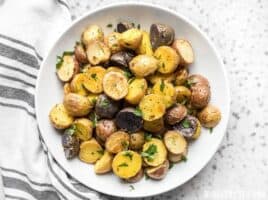

It would be helpful to know how many cups TOTAL of vegetables to use.
The beauty of the recipe is that it really doesn’t matter how many vegetables you have/need. So it’s great for cleaning out the fridge! Although, I would say to shoot for something in the ballpark of 3-4 cups. The marinade can also be kept refrigerated in an air-tight container for a few weeks (or longer) if you make a bit more than you need. It will separate over time, but just shake it to re-emulsify. ~ Marion :)